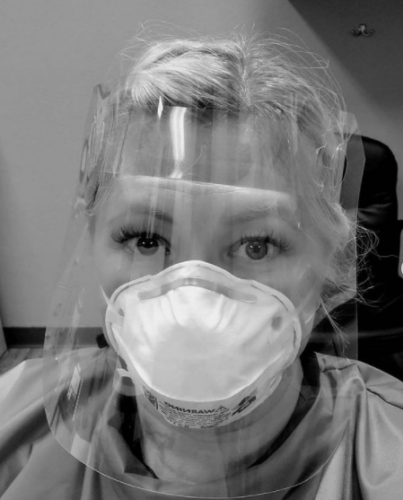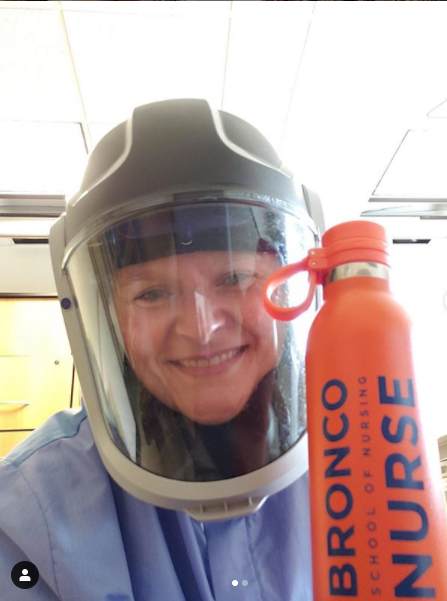According to the World Health Organization, nurses are the largest group of healthcare workers in the world. Nurses throughout history have served on the frontlines of widespread health crises, natural disasters and epidemics.
“Nurses have always cared for the sick, the well and the dying. We promote health and prevent illness. We interpret what is happening so that patients understand it,” said Leslie Neal-Boylan, dean of the Solomont School of Nursing at the University of Massachusetts Lowell.
Nurses serving in the COVID zone often treat more than just a disease; they support patients and their families during frightening and stressful moments. Melanie Kanawyer, a 2020 Boise State graduate now working in Boise, describes playing an unexpected support role for her patients when friends and family are unable to visit due to protocols to limit exposure.
“It’s strange to not be able to accommodate family and friends. We’re that supportive role for patients. It’s hard, but you can’t afford to be shy [as a nurse]. You need to make it all about your patient.”

In West Palm Beach, Florida, Marcus Daly is working on another cardiac floor that has been adapted for COVID patients. He is a remote-learning students completing Boise State’s RN-BS undergraduate program. Over his nine years of nursing experience, he has joined the tradition of educating patients and their families regarding illnesses and treatment plans.
“Especially now, with COVID and all of the unknowns, my patients need to understand what is happening. The better they understand our goals, the more they can help us achieve them. It creates a team,” he said.
Nurses also have a long history of going where they are needed, often risking their lives to administer care for their patients. Dorothea Dix, an advocate for indigienous Americans, and Clara Barton, the founder of the Red Cross, were among thousands of nurses who treated soldiers and coordinated care during the American Civil War. Nurses from all over the country rushed to large cities to treat patients affected by the 1878 yellow fever epidemic in Memphis, Tennessee, and again during the 1918 influenza pandemic. Nurses also served alongside law enforcement and first responders during rescue efforts in the immediate aftermath of 9/11.
Many hospitals are co-opting specialty units and areas for use as designated COVID units. Jacob Dalmas is also a 2019 graduate and currently works in the cardiovascular intensive care unit at Saint Alphonsus in Boise. He works closely with patients undergoing surgeries such as heart valve replacements or coronary bypass, but has assisted briefly in the hospital’s COVID unit. When working with COVID patients, he is required to wear a powered air-purifying respirator suit, a full-body suit that protects the wearer from contaminated air.

Bryan Garrett, a final-semester student in the Master’s of Nursing program, has been working as an RN for 12 years, and more recently took up leadership roles in the clinical space. When describing how his hospital has adapted in the time of COVID-19, Garret said, “It’s been interesting, and it’s been tough: we’ve become singularly focused on one disease while all of the others still exist. We have to be COVID aware without being COVID consumed.”
Garrett said hospitals used to be a very open place; now, healthcare professionals have to create a balance between letting family members have access to their loved ones while limiting patient exposure. Patient experiences in today’s hospitals are vastly different than they were in 1878 and 1918, though, with modern technology safely connecting patients to their loved ones. Telecommunication technology like Zoom has played an important role in keeping morale up by allowing patients to communicate with friends and family during their stay, while adhering to new visitation guidelines.
Nurses have been ranked as the most honest and ethical professionals in many countries, including America, Great Britain and Ireland. In America, nurses have ranked at the top for 18 years in a row. Disasters and accidents will occur, pandemics and crises will arise, and nurses will always play an essential role in relief and recovery. Leslie Neal-Boylan, in her article “Nurses on the front lines: A history of heroism from Florence Nightingale to coronavirus,” said it best: “You will find us caring for people in their homes, in public health departments, in nursing homes and skilled care facilities, in rehabilitation hospitals, in prisons and correctional institutions, caring for the mentally ill and providing health care advice over phones and computers. Nurses work wherever there are people…we are professionals. Once the COVID-19 crisis is over, please don’t forget that we are always here for you.”
~ By Angela Fairbanks